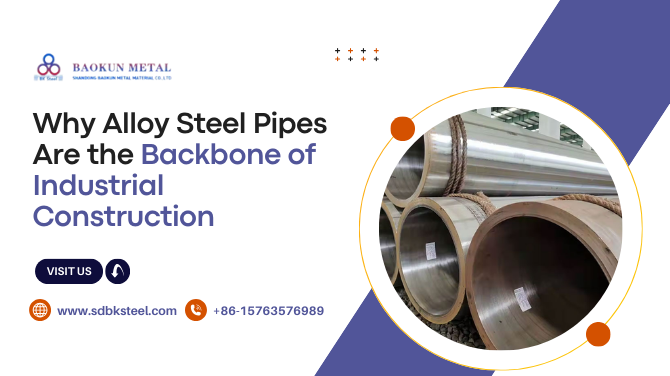
In the fast-paced world of industrial construction, every component must meet high standards for strength, durability, and reliability. When it comes to materials used in building the infrastructure that powers industries globally, alloy steel pipes have become the undisputed backbone. These versatile, high-performance pipes are crucial in various sectors, including construction, oil and gas, power generation, and manufacturing. But what makes alloy steel pipes so essential, and why are they considered the go-to material for large-scale industrial projects?
This article will delve into the reasons why alloy steel pipes have earned their place as a critical part of industrial construction. We’ll explore their key features, advantages, and the specific applications that rely on them for optimal performance. Moreover, we will highlight how companies like Shandong Baokun Metal Material Co. Ltd are at the forefront of providing high-quality alloy steel pipes to meet the demanding needs of modern construction projects.
What Are Alloy Steel Pipes?
To fully appreciate the importance of alloy steel pipes, it’s essential to understand what they are. An alloy steel pipe is a type of pipe that is made from alloy steel, which is a mixture of carbon steel and additional alloying elements such as chromium, molybdenum, vanadium, and nickel. These elements are added to improve the properties of the steel, such as its strength, corrosion resistance, and ability to withstand high temperatures.
The precise combination of alloying elements determines the characteristics of the pipe, making it suitable for various applications where standard carbon steel pipes may fall short. Alloy steel pipes are widely used in industries such as oil and gas, power plants, petrochemicals, and construction, where durability and performance are critical.
Key Features of Alloy Steel Pipes
The unique characteristics of alloy steel pipes make them a preferred choice in demanding industrial applications. Here are some of the key features that set these pipes apart:
- Strength and Durability: The alloying elements in the steel provide significant strength, enabling the pipes to withstand heavy loads, high-pressure environments, and extreme temperatures.
- Corrosion Resistance: Depending on the alloy composition, these pipes can offer exceptional resistance to corrosion, even in harsh environments such as offshore rigs or chemical processing plants.
- High Temperature Resistance: Alloy steel pipes can handle high-temperature conditions, making them suitable for use in power plants, boilers, and steam pipelines.
- Versatility: Alloy steel pipes are available in various grades, allowing them to be tailored for specific applications. This versatility makes them ideal for a wide range of industries.
- Weldability and Formability: Alloy steel pipes can be easily welded and formed, allowing for customization to fit the specific needs of the construction or manufacturing process.
Why Alloy Steel Pipes Are Crucial for Industrial Construction?
Industrial construction relies heavily on materials that are both strong and reliable. Alloy steel pipes offer an unmatched combination of properties that make them indispensable for various construction and infrastructure projects. Let’s explore why these pipes are considered the backbone of the industry.
1. High Load-Bearing Capacity
One of the primary reasons alloy steel pipes are used in industrial construction is their superior load-bearing capacity. These pipes are capable of withstanding substantial pressure and heavy loads without compromising their integrity. This makes them ideal for structural applications, such as in the construction of bridges, tunnels, and industrial plants, where the pipes must endure constant stress and weight.
The strength of alloy steel pipes is essential in industries like oil and gas, where pipelines need to withstand high-pressure fluids traveling through them for long distances. The increased strength from the alloying elements ensures that the pipes won’t buckle or break under extreme conditions.
2. Resistance to Harsh Environments
Industrial construction sites are often exposed to harsh environmental factors, such as extreme temperatures, corrosive chemicals, and moisture. Whether it’s a pipeline running through a chemical plant or a structural component exposed to the elements, alloy steel pipes excel in these conditions.
The corrosion resistance of alloy steel, especially in grades that contain chromium and nickel, ensures that the pipes can withstand the effects of rust and degradation, even when exposed to saltwater or other corrosive substances. This is particularly valuable in offshore oil rigs or marine-based construction projects, where materials are constantly exposed to the corrosive effects of seawater.
3. Ability to Withstand High Temperatures
In industries such as power generation and petrochemical processing, alloy steel pipes are required to function in environments with high temperatures. The addition of alloying elements like molybdenum and vanadium helps to increase the heat resistance of the steel, making these pipes ideal for carrying hot gases, steam, and fluids.
For example, power plants that rely on steam turbines often use alloy steel pipes for their steam lines due to the pipes’ ability to handle temperatures of up to several hundred degrees Celsius. Without the durability provided by the alloying elements, the pipes would deteriorate too quickly in such extreme conditions.
4. Reliability in Critical Infrastructure
When it comes to infrastructure that is critical to the functioning of an industry, reliability is key. Alloy steel pipes are often used in critical infrastructure projects where failure could lead to disastrous consequences. For example, in the oil and gas sector, pipelines must be able to carry petroleum products over long distances safely. Similarly, power plants depend on alloy steel pipes to transfer steam, gas, and liquids that power the plant’s turbines and cooling systems.
The reliability of alloy steel pipes ensures that industrial systems remain functional for extended periods, reducing downtime and minimizing the need for repairs or replacements. This is especially important for industries that cannot afford to halt production for maintenance.
5. Cost-Effectiveness in the Long Run
While alloy steel pipes might come with a higher upfront cost compared to other types of pipes, their long-term cost-effectiveness is undeniable. The strength, durability, and resistance to corrosion and high temperatures make these pipes a smart investment for industries that require dependable materials.
Over time, the reduced need for repairs, replacements, and maintenance contributes to lower operational costs. Additionally, the longer lifespan of alloy steel pipes means that businesses can rely on the infrastructure for years without having to worry about frequent replacements or failures.
6. Versatility Across Industries
Alloy steel pipes are highly versatile and are used across a broad spectrum of industries. In construction, they are used in structural components, pipelines, and reinforcement bars. In the power generation industry, they are utilized in steam lines, cooling systems, and turbines. The oil and gas industry depends on these pipes for the transportation of fluids and gases under extreme pressure, while the chemical and petrochemical sectors use them to handle corrosive substances safely.
Their versatility means that alloy steel pipes are not limited to one application or one sector; they are integral to numerous industries, each with its own set of specific needs. Their ability to meet the demands of such diverse applications is one of the key reasons they are considered the backbone of industrial construction.
Applications of Alloy Steel Pipes in Industrial Construction
1. Pipelines for Oil and Gas
In the oil and gas sector, alloy steel pipes are indispensable for the transportation of crude oil, natural gas, and other petroleum products. These pipes need to be able to withstand the harsh conditions found in offshore and underground installations, making alloy steel pipes the ideal material due to their strength and resistance to corrosion.
2. Power Generation Plants
For power plants, alloy steel pipes are used in various applications, from steam lines to cooling systems. The ability of these pipes to endure high temperatures without warping or weakening is essential to the efficient functioning of a power plant.
3. Chemical and Petrochemical Industries
In the chemical and petrochemical industries, the transfer of hazardous fluids and gases requires pipes that are resistant to corrosion and can handle aggressive substances. Alloy steel pipes meet these demands, ensuring safe and efficient transportation of chemicals.
4. Construction and Infrastructure
Alloy steel pipes are commonly used in construction projects where structural integrity and durability are critical. They are used in reinforcement bars, foundation systems, and as part of the framework for large-scale industrial buildings.
Conclusion
Alloy steel pipes are undeniably the backbone of industrial construction. With their exceptional strength, resistance to harsh environments, high-temperature tolerance, and versatility, these pipes provide the durability and reliability needed in critical applications across multiple industries. Whether in pipelines for oil and gas, power plants, chemical processing, or general construction, alloy steel pipes prove time and again to be the ideal choice for demanding projects.
For industries that rely on alloy steel pipes, sourcing high-quality materials from reputable suppliers like Shandong Baokun Metal Material Co. Ltd ensures that construction projects can be completed on time and within budget while maintaining the highest standards of safety and performance. The long-term value provided by these pipes makes them a sound investment, one that will continue to support industrial infrastructure for years to come.
